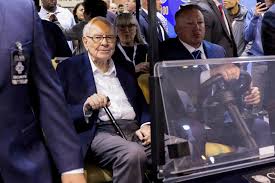Summary
- Buffett to step down as Berkshire CEO at year-end
- Greg Abel says he is “humbled and honored” to take the role
- Buffett says he has “zero” intention to sell any Berkshire stock
OMAHA, Nebraska, May 3 (Reuters) – Warren Buffett announced he will step down as CEO of Berkshire Hathaway at the end of 2025, ending a legendary 60-year career that transformed the company into one of the most successful conglomerates in American history. The 94-year-old investor will hand over the reins to Vice Chairman Greg Abel, marking the culmination of a long-anticipated succession plan.
Buffett made the announcement during Berkshire’s annual shareholder meeting in Omaha, saying the time had come for Abel to assume the top role. “I think the time has arrived where Greg should become the chief executive officer of the company at year end,” Buffett said, adding that he would still “hang around” and offer help in certain situations, but the final say would belong to Abel.
The transition marks the end of an era not just for Berkshire, but for American capitalism. Buffett, dubbed the “Oracle of Omaha,” became one of the world’s most admired investors, amassing a $168 billion fortune and building Berkshire into a $1.16 trillion giant spanning insurance, railroads, energy, retail, and more. Since taking over the struggling textile firm in 1965, Buffett’s leadership drove Berkshire stock up more than 5 million percent.
Greg Abel, 62, has been Vice Chairman since 2018 and was publicly identified as Buffett’s successor in 2021. He has overseen Berkshire’s non-insurance businesses and was previously CEO of Berkshire Hathaway Energy. Abel responded to the announcement by telling shareholders he was “humbled and honored” to take on the role.
Buffett reassured investors that he has no plans to sell any of his Berkshire stock. “The decision to keep every share is an economic decision because I think the prospects of Berkshire will be better under Greg’s management than mine,” he said. Most of Buffett’s holdings are expected to be donated to charity after his death.
The move surprised some, as Buffett said even most of Berkshire’s board hadn’t been informed before the public announcement. The board is scheduled to meet on Sunday to discuss the leadership transition. Abel will take over a company with nearly 200 businesses and over $264 billion in stock holdings, including major stakes in Apple, American Express, and Bank of America.
Tributes to Buffett poured in following the news. JPMorgan Chase CEO Jamie Dimon called him “everything that is good about American capitalism,” while Apple’s Tim Cook praised his wisdom and integrity. “There’s never been someone like Warren,” Cook said.
As Abel steps into the spotlight, questions remain about how closely he can replicate Buffett’s unique blend of investing acumen and cultural leadership. Abel has already assumed many of Buffett’s operational duties and said his approach may be “more active, but hopefully in a very positive way.”
Some analysts are watching to see if Berkshire can maintain its “Buffett premium” — the extra investor confidence tied to Buffett’s personal reputation. “You’re buying a stock and you’re also getting the investing prowess of a legend. With that legend gone, what is the value?” said Cathy Seifert of CFRA Research.
Buffett’s longtime partner Charlie Munger, who passed away in November 2023, was instrumental in Berkshire’s rise. The duo’s investment philosophy, rooted in the teachings of Benjamin Graham, emphasized long-term value and conservative financial discipline.
Despite his immense wealth, Buffett maintained a famously modest lifestyle, never moving from the Omaha home he bought in 1958 for $31,500. His philanthropic legacy also looms large, having already donated more than half of his Berkshire shares and planning to leave nearly all of the remainder to charity through a trust overseen by his children.
Looking ahead, Abel will face challenges in deploying Berkshire’s $347.7 billion cash pile wisely, deciding whether to initiate a dividend, and maintaining the company’s decentralized culture. Howard Buffett, Warren’s son, is expected to eventually succeed him as non-executive chairman to help preserve Berkshire’s core values.
Berkshire’s annual shareholder gathering, dubbed “Woodstock for Capitalists,” is expected to continue in the post-Buffett era, though many believe the event’s magic may fade. For now, the company enters a new chapter — guided by a trusted hand, but without the legend who built it.

